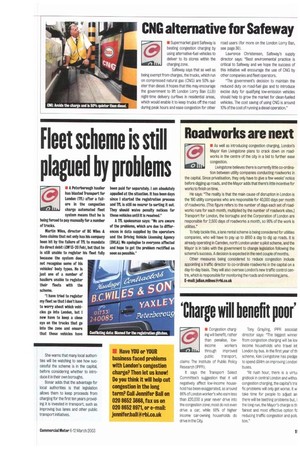• As well as introducing congestion charging. London's Mayor Ken
Page 15

If you've noticed an error in this article please click here to report it so we can fix it.
Livingstone plans to crack down on roadworks in the centre of the city in a bid to further ease congestion.
Livingstone believes there is currently little co-ordination between utility companies conducting roadworks in the capital. Since privatisation, they only have to give a few weeks' notice before digging up roads, and the Mayor adds that there's little incentive for works to finish on time.
He says: "The reality is that the main cause of disruption in London is the 190 utility companies who are responsible for 40,000 days per month of roadworks. [This figure refers to the number of days each set of roadworks runs for each month, multiplied by the number of roadwork sites.) Transport for London, the boroughs and the Corporation of London are responsible for 2,500 days of roadworks a month, so 95% of the work is To help tackle this, a lane rental scheme is being considered for utilities companies, who will have to pay up to £650 a day to dig up roads. It is already operating in Camden, north London under a pilot scheme, and the Mayor is in talks with the government to change legislation following the scheme's success. A decision is expected in the next couple of months.
Other measures being considered to reduce congestion include appointing a traffic director to co-ordinate roadworks in the capital on a day-to-day basis. They will also oversee London's new traffic control centre, which is responsible for monitoring the roads and minimising jams. E-mail: Jullan.mllnes(krbi.co.uh




































































































































































